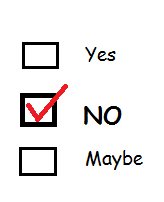
The official definition in the Urban Dictionary for “Go Big or Stay Home” is that it is used to goad someone into an outlandish or awesome act.
It’s a challenge phrase.
This month we are checking in on our progress with the goals we set at the beginning of the year. It’s also a great time to reflect on whether or not we set the right goals. Did we choose to do something beyond the normal and really commit to getting it done? Those are the scary goals, the ones we aren’t quite sure we can meet.
Those are the challenge goals, the ones that drive us to accomplish something.
So you set a writing goal or a personal goal this year? Was it a challenge goal, or was it a safety goal, one designed to make an incremental, tiny step forward, using the same stride used in the past? One that let’s us celebrate repainting the same-old situation?
It’s easy to plod along doing the same thing we’ve done before and celebrate  minuscule progression, but sometimes the only way to really get where we want to go is to completely change and try something totally different. To challenge ourselves to take the leap we dream of taking but which scares us to death.
minuscule progression, but sometimes the only way to really get where we want to go is to completely change and try something totally different. To challenge ourselves to take the leap we dream of taking but which scares us to death.
For example, when I first started writing seriously, my first novel took way too long, partly because my writing was just awful, but partly because my schedule did not allow much time for writing. So I set the goal to rearrange my working schedule to allow more writing time. It took a few years and some pretty big risks and sacrifices from the entire family to accomplish that goal, but I did it.
This year I realized I was not taking enough advantage of that newfound freedom, so I set a huge goal of completing four new novels this year. Sure I had started outlining them, but did not have any first drafts completed. And yet, that’s what it would take to reach the next level. So I set the goal and began to work it. Last week I wrote 26,000 words to complete one of those novels on time. One piece of the overall goal is complete. Lots more to go.
No matter our individual circumstance, we can all set change goals and decide if we’re going to go big or stay home. Most people don’t bother.
They stay home.
Most people are content to go to work, fill an honest eight hours, and then literally just go home and watch tv. Those people have a safe existence. They do not have to take risks, do not have to stretch and grow, do not risk failure and ridicule. But they also never go big. They never accomplish challenge goals to celebrate incredible victories and learn to take control of their lives.
 Of those who decide to make a change, who say they are going to Go Big, most of them don’t make it. Sure, from a writing perspective some people are just so bad that they simply lack the capacity to do it, but those are the exceptions. Most people COULD write a competitive book if they REALLY wanted to, yet most of them fail. It’s not because they CAN’T do it, but because they lack staying power. Like the graph illustrates, saying you have a great idea is nothing. Starting a book is when we first get some skin in the game but doesn’t mean a whole lot either. Actually finishing a book is huge, but even that’s not the ultimate goal. We want to finish something someone else will pay to read. Challenge goals are the vehicle to take us there.
Of those who decide to make a change, who say they are going to Go Big, most of them don’t make it. Sure, from a writing perspective some people are just so bad that they simply lack the capacity to do it, but those are the exceptions. Most people COULD write a competitive book if they REALLY wanted to, yet most of them fail. It’s not because they CAN’T do it, but because they lack staying power. Like the graph illustrates, saying you have a great idea is nothing. Starting a book is when we first get some skin in the game but doesn’t mean a whole lot either. Actually finishing a book is huge, but even that’s not the ultimate goal. We want to finish something someone else will pay to read. Challenge goals are the vehicle to take us there.
So what if you have to write ten years before you make a sale? Those ten years are going to pass anyway. So what if you get rejected? The best writers rack up dozens, if not hundreds, of rejections. It’s not the rejection that defines success but the overcoming of that rejection and the continued consistency.
I spoke with Brandon Sanderson earlier this year and when I mentioned I had been writing for almost ten years he nodded and said, “Great, then you’re just about ready to break in.”
Before lightning can strike, you have to make yourself the lightning rod.
Before you can be the lucky winner, you have to compete.
Before you can become an overnight success, you have to work for years to prepare yourself and develop the skills to break out big.
Some people just need a push, someone to challenge them to make a change goal. If you’re one of those, the music video by Switchfoot for their song “I Dare you to Move” might help. Check it out here.
So this month as we reflect where we are with our goals and compare that against where we want to be in six months or one year or ten years, let’s ask ourselves, “Am I going big or staying home?”
Go Big.


